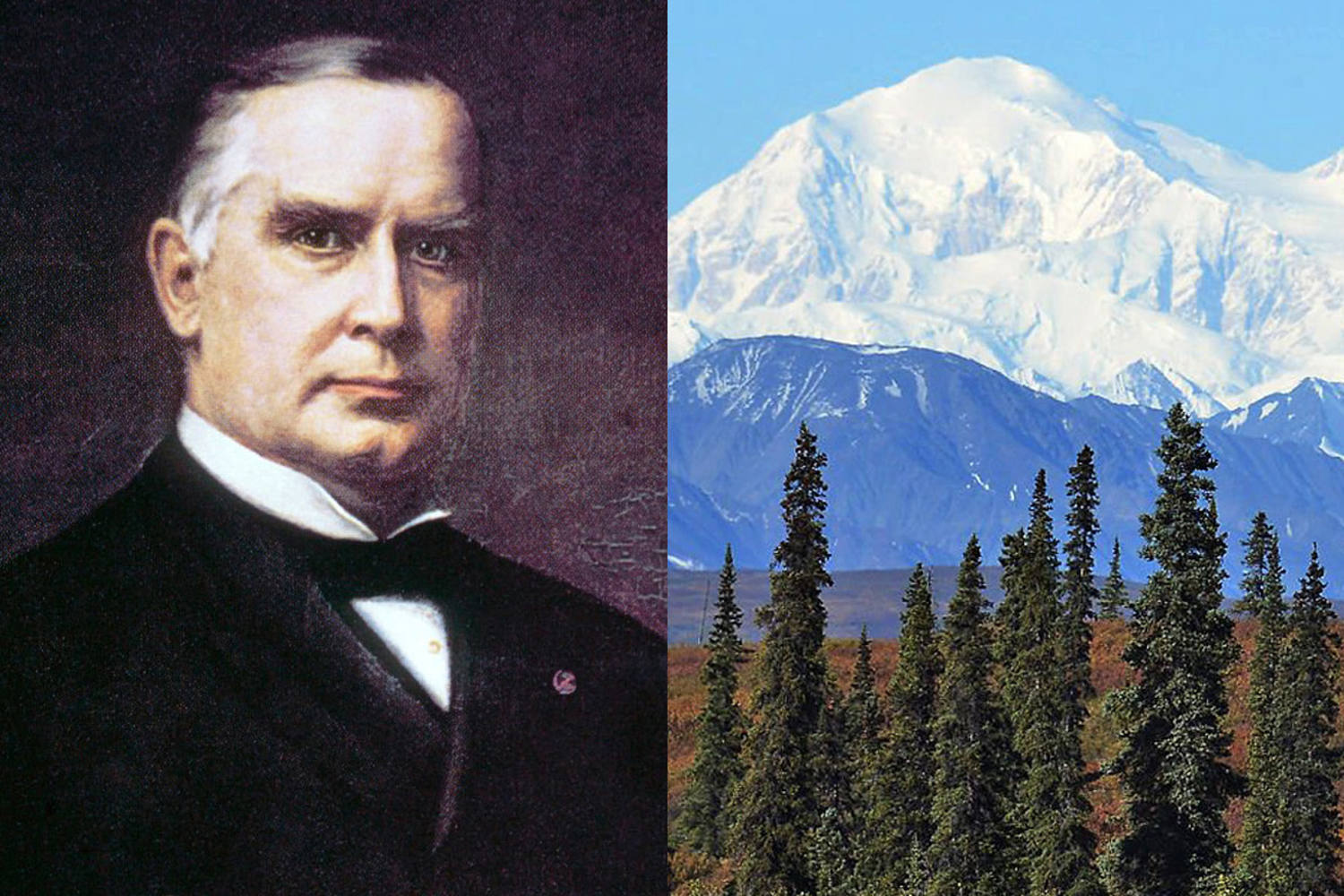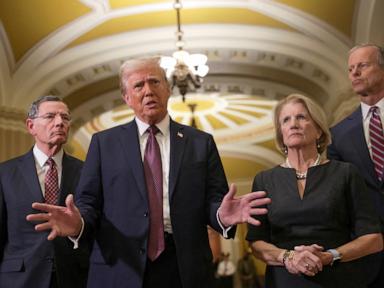Trump’s tariffs model McKinley; his divided coalition models Grover Cleveland

In his 2025 inaugural address, Donald Trump compared himself to former President William McKinley boasting that he, like McKinley, would make “our country very rich through tariffs.”
A recent issue of The Economist drew a similar comparison, noting that McKinley was an imperialist who added Hawaii, Guam, the Philippines and Puerto Rico to U.S. territory and made Cuba a U.S. protectorate. Trump, of course, would like to annex Canada and Greenland while assuming full U.S. control over the Panama Canal.
To make the comparison complete, McKinley was backed by the titans of his day, including J.P. Morgan and John D. Rockefeller. At his inauguration, Trump surrounded himself with the titans of the 21st century: Elon Musk, Sam Altman, Mark Zuckerberg and Jeff Bezos.
But still, a more apt comparison might be with Grover Cleveland. Like Trump, Cleveland was elected to non-consecutive terms. Both won close races in their first outings, lost narrowly a second time, and came back to win.
Comparisons between Trump and Cleveland do not end there. Professor Daniel Klinghard, author of “The Nationalization of American Political Parties, 1880-1896,” writes that Cleveland positioned himself as a “party outsider, battling for the good of the people.” By casting himself in this light, Cleveland created “an almost mystical bond between himself and the nation at large.”
Sound familiar?
During each of their successful campaigns for a second term, both Cleveland and Trump unified disparate elements of their political parties. In an interview, Klinghard noted that Cleveland united southern farmers with northern urbanites, whereas Trump aligned himself with the plutocrats and the working class.
Each benefited from a retrospective nostalgia of their first terms in office, and both won back the presidency by larger margins than their first victories.
As Klinghard observes, Cleveland’s rise to power was meteoric. Given the Democrats’ continuous losses following the Civil War, Cleveland was seen by Democrats as their party’s savior, having finally returned them to the White House in 1884.
Trump enjoyed a similar status after the drubbings Republicans took in 2008 and 2012. In both cases, their fans, as Klinghard writes of Cleveland, “loved him most for the enemies he has made.”
But for Cleveland, the party unity he forged proved to be temporary. Ethnic northern city-dwellers wanted cheap goods and low tariffs. During his first term, Cleveland told Congress that high tariffs were “vicious, inequitable, and [an] illogical source of unnecessary taxation, ought to be at once revised and amended.” But southern farmers wanted high tariffs to protect their markets.
Like Cleveland, Donald Trump has forged a tenuous alliance between the working class and the plutocrats. Trump’s upending of Franklin D. Roosevelt’s New Deal coalition has shattered the Democratic Party’s image of supporting the common man. As one laborer who used to vote Democratic put it, “The grunts in the lunchroom love Trump.”
But Trump’s alliance with today’s plutocrats is fraught with peril. A poll taken shortly before Trump’s inauguration found six in 10 respondents saying that Trump’s reliance on billionaires is a bad thing. Fifty-two percent had an unfavorable opinion of Elon Musk. And majorities thought the government was spending too little on education, Social Security, Medicare, Medicaid and assistance to the poor.
Trump’s intent to smash the institutions of government, as David Brooks has noted, puts him at odds with the working class who depend on those same institutions. During a visit to North Carolina, Trump suggested getting rid of the Federal Emergency Management Agency, whose purpose is to assist poor and middle-class families whose lives have been upended by natural disasters.
The Musk-led Department of Government Efficiency is considering drastic cuts that would affect middle-class families who support Trump. This includes cuts to Medicare and Medicaid; an increased Social Security retirement age; decreased access to Obamacare; drastic cuts to the Departments of Education, Veterans Affairs and the Postal Service; and limits on student loans.
As Brooks writes, if you disrupt and disassemble those agencies of government designed to help ordinary citizens, where are they supposed to go?
Trump was elected to do two things: bring down costs and secure the border. He wasn’t elected to annex Greenland, make Canada the 51st state, enact high tariffs that increase the cost of everything from lumber to energy prices, to agricultural products or give pardons to violent protestors who beat cops on Jan. 6, 2021.
Cleveland’s second term ended in failure. The Panic of 1893 destroyed the bridge Cleveland had built between southern farmers and northern city-dwellers. As Klinghard notes in an interview, by 1896, the one Democrat who previously could unify the party no longer could.
Today, Donald Trump is the glue that holds the Republican Party together. But will the bridges he built between laborers and plutocrats, between nationalists like Steve Bannon and the uber-rich free-market-loving tech billionaires, hold? Already, Bannon and Musk are engaged in a bitter feud.
Is Trump, like Cleveland, a political phenomenon who can unify his party but may not determine our long-term political future especially given the two-term limit the Constitution imposes on the presidency?
Karl Rove, not one of Donald Trump’s favorites, wrote that William McKinley remade the Republican Party into a “frothy, diverse coalition of owners and workers, longtime Americans and new citizens, lifetime Republicans and fresh converts drawn together by common beliefs and allegiances.” For 20 of the next 28 years, from McKinley’s first election in 1896 until Franklin D. Roosevelt’s victory in 1932, Republican presidents called the White House home.
No wonder Trump compares himself to William McKinley. But he might turn out to be Grover Cleveland instead.
John Kenneth White (johnkennethwhite.com) is a professor emeritus at The Catholic University of America. His latest book is titled “Grand Old Unraveling: The Republican Party, Donald Trump, and the Rise of Authoritarianism.”
Topics
-

Democrats want answers on cost-cutting prescription payment models abandoned by Trump
House Democrats want to know what the Trump administration plans to do after it rescinded a Biden-era executive order to study potential payment models for lowering prescription drug costs, looking ...The Hill - 3d -

David Beckham is modelling in his pants again. Will he not think of his fellow middle-aged men?
His bronzed torso is ridiculously ripped – and will, once again, cause a shift in the acceptable minimum standards for the male physique. So much for the dad bod. David Beckham, who turns 50 this ...The Guardian - 3d -

Trump’s tariffs could undo his ‘America First’ agenda
Tariffs fly in the face of the rest of Trump’s economic agenda.The Hill - 6d -

Trump’s Jan. 6 pardons divide House Republicans
President Trump’s decision to pardon hundreds of protesters who stormed the Capitol on Jan. 6, 2021 — including many accused of assaulting police officers — is dividing House Republicans, with some ...The Hill - Jan. 23 -

A McKinley descendant voices a compromise after Trump orders Denali renamed
Trump's decision is being met with resistance, as many Alaska lawmakers, including its two Republican Senators, have voiced opposition to the change.NBC News - Jan. 23 -

Why does Trump want to rename Denali after President McKinley?
Why does Trump want McKinley's name restored to the continent's highest point?The Hill - Jan. 20 -

Trump’s tariff plans could be harming his ‘animal spirit’ investors
The big unknown is how far Trump is prepared to go to win a trade war before it winds up crushing animal spirits.The Hill - Jan. 17 -
A secret to Quentin Lake's Rams success? Having his All-Pro dad as a role model
Quentin Lake has been a lockdown force in the Rams' secondary, and much of his development at UCLA and in the NFL was bolstered by his father, Carnell Lake.Yahoo Sports - Jan. 13 -

Trump and Senate Republicans still divided on how to implement his agenda
President-elect Donald Trump is meeting with Senate Republicans to try to get lawmakers "on the same page" on how to advance some of his major policy initiatives.ABC News - Jan. 8
More from The Hill
-

New York AG warns hospitals against suspending gender-affirming care
New York’s Democratic Attorney General Leticia James warned hospitals Monday that prematurely pausing gender-affirming care for transgender minors in compliance with a recent executive order from ...The Hill - 27m -

Interim US attorney: 'We will not tolerate threats against DOGE workers'
The acting U.S. attorney for the District of Columbia is coordinating with Elon Musk over alleged “threats” as the Department of Government Efficiency (DOGE) staff has pushed into various ...The Hill - 36m -

Trump praises Patel as he blasts 'very corrupt' FBI
President Trump on Monday praised his pick to head the FBI, Kash Patel, as “the one guy” to “make the FBI great again,” days after his confirmation hearing. “Look at what they've done in terms of ...The Hill - 42m -

Trump's China gamble: Redefining US-Beijing relations
Donald Trump has expressed a fondness for TikTok and has allowed the app to resume operations in the U.S., despite his insistence that it be at least 50 percent American-owned. However, his ...The Hill - 45m -

Democrats blocked from entering USAID headquarters
A group of Senate and House Democrats were blocked from entering the headquarters of the U.S. Agency for International Development (USAID) on Monday. The Democratic lawmakers, who are opposed to ...The Hill - 45m
More in Politics
-

New York AG warns hospitals against suspending gender-affirming care
New York’s Democratic Attorney General Leticia James warned hospitals Monday that prematurely pausing gender-affirming care for transgender minors in compliance with a recent executive order from ...The Hill - 27m -

Interim US attorney: 'We will not tolerate threats against DOGE workers'
The acting U.S. attorney for the District of Columbia is coordinating with Elon Musk over alleged “threats” as the Department of Government Efficiency (DOGE) staff has pushed into various ...The Hill - 36m -

Trump praises Patel as he blasts 'very corrupt' FBI
President Trump on Monday praised his pick to head the FBI, Kash Patel, as “the one guy” to “make the FBI great again,” days after his confirmation hearing. “Look at what they've done in terms of ...The Hill - 42m -

Trump's China gamble: Redefining US-Beijing relations
Donald Trump has expressed a fondness for TikTok and has allowed the app to resume operations in the U.S., despite his insistence that it be at least 50 percent American-owned. However, his ...The Hill - 45m -

Democrats blocked from entering USAID headquarters
A group of Senate and House Democrats were blocked from entering the headquarters of the U.S. Agency for International Development (USAID) on Monday. The Democratic lawmakers, who are opposed to ...The Hill - 45m
